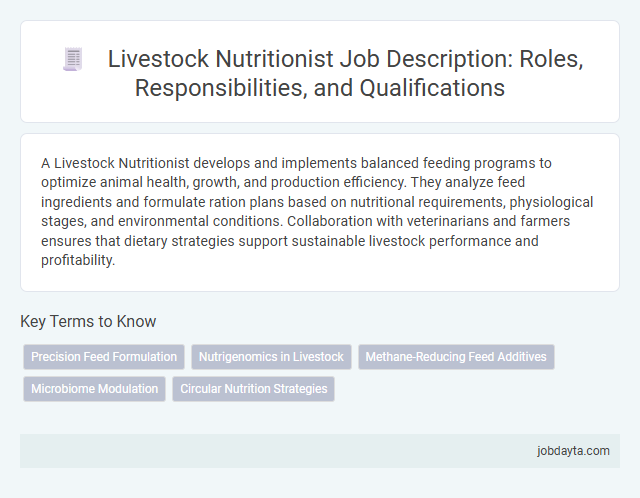A Livestock Nutritionist develops and implements balanced feeding programs to optimize animal health, growth, and production efficiency. They analyze feed ingredients and formulate ration plans based on nutritional requirements, physiological stages, and environmental conditions. Collaboration with veterinarians and farmers ensures that dietary strategies support sustainable livestock performance and profitability.
Overview of a Livestock Nutritionist
A livestock nutritionist specializes in formulating balanced diets to optimize the health and productivity of farm animals. They analyze nutrient requirements and develop feeding programs to enhance livestock growth, reproduction, and overall well-being.
- Role in Animal Health - Ensures animals receive essential nutrients for immune function and disease prevention.
- Feed Formulation Expertise - Designs precise feed rations using scientific data and ingredient analysis for cost-effective nutrition.
- Impact on Farm Productivity - Improves livestock performance, milk yield, and weight gain through tailored nutrition plans.
Key Roles and Responsibilities
Livestock nutritionists play a crucial role in optimizing animal health and productivity on farms. Their expertise ensures balanced diets that improve growth rates and overall livestock well-being.
- Diet Formulation - Design precise feed plans tailored to the specific nutritional needs of different livestock species.
- Health Monitoring - Evaluate animal health indicators to adjust nutrition strategies and prevent deficiencies or diseases.
- Research Implementation - Apply latest scientific findings to enhance feed efficiency and reduce production costs.
Essential Qualifications and Education
What are the essential qualifications required for a livestock nutritionist? A livestock nutritionist typically needs a bachelor's degree in animal science, agriculture, or a related field. Advanced knowledge in animal nutrition, feed formulation, and health management is crucial for optimizing livestock growth and productivity.
How important is formal education in becoming a successful livestock nutritionist? Your education lays the foundation for understanding complex nutritional needs and dietary requirements of various livestock species. Many professionals pursue certifications or a master's degree to enhance expertise and career opportunities in this specialized field.
Required Technical Skills and Expertise
A Livestock Nutritionist must possess in-depth knowledge of animal physiology, feed composition, and nutrient requirements to formulate balanced diets that maximize livestock health and productivity. Expertise in analyzing feed ingredients, understanding metabolic processes, and utilizing software for ration formulation is essential. Proficiency in monitoring animal growth, diagnosing nutritional deficiencies, and implementing sustainable feeding strategies ensures optimal livestock performance and welfare.
Daily Tasks and Workflow
A Livestock Nutritionist evaluates animal diets to optimize health and productivity. They analyze feed ingredients, formulate balanced rations, and monitor livestock performance daily. Regular collaboration with farmers ensures tailored nutrition plans that meet specific species and growth stages.
Importance of Animal Health and Nutrition
Maintaining optimal animal health is vital for successful livestock management. Proper nutrition supports growth, productivity, and disease resistance in livestock.
- Balanced Diets - Essential nutrients improve immune function and overall animal well-being.
- Preventive Health - Adequate nutrition reduces the risk of metabolic and infectious diseases.
- Productivity Boost - Well-nourished animals produce higher quality meat, milk, and eggs.
You play a crucial role in ensuring your animals receive the best nutrition for long-term health and farm profitability.
Collaboration with Farmers and Veterinarians
| Role | Livestock Nutritionist |
|---|---|
| Focus Area | Collaboration with Farmers and Veterinarians |
| Key Responsibilities |
|
| Collaborative Activities |
|
| Impact on Agriculture |
|
Tools and Technologies Used in Livestock Nutrition
Livestock nutritionists utilize advanced software tools to formulate balanced diets tailored to the specific needs of different animal species. Precision feeding technologies help optimize nutrient intake, improving animal health and productivity.
Innovative sensors and wearable devices monitor real-time physiological data, enabling adjustments to nutrition plans based on individual animal performance. Data analytics platforms integrate various inputs, enhancing decision-making for effective livestock management.
Challenges Faced by Livestock Nutritionists
Livestock nutritionists play a crucial role in optimizing animal health and productivity through precise dietary management. They face the challenge of balancing nutrient requirements while minimizing feed costs in varying environmental conditions.
Adapting to emerging diseases and changes in feed ingredient availability demands continuous research and formulation adjustments. Ensuring sustainable feeding practices amid climate change pressures adds complexity to their responsibilities.
Career Growth and Job Outlook in Agriculture
Livestock nutritionists play a vital role in the agriculture industry by formulating balanced diets that enhance animal health and productivity. Their expertise directly influences the efficiency and sustainability of livestock operations.
Career growth for livestock nutritionists is robust, driven by increasing demand for sustainable farming practices and improved animal welfare. Job opportunities span farms, research institutions, and feed manufacturing companies. Your skills in animal nutrition can lead to specialized roles and leadership positions in this expanding field.
Related Important Terms
Precision Feed Formulation
Precision feed formulation by livestock nutritionists enhances animal health and productivity by tailoring nutrient profiles to specific genetic breeds and growth stages. Utilizing advanced data analytics and real-time monitoring technologies, these experts optimize feed efficiency and minimize environmental impact through targeted supplementation and waste reduction.
Nutrigenomics in Livestock
A livestock nutritionist specializing in nutrigenomics leverages genetic information to tailor precise dietary plans that optimize animal health, growth, and productivity. Integrating genomics with nutrition science enhances feed efficiency, disease resistance, and reproductive performance in cattle, swine, and poultry.
Methane-Reducing Feed Additives
Methane-reducing feed additives such as 3-NOP (3-nitrooxypropanol) and tannins are scientifically proven to lower enteric methane emissions from ruminants by inhibiting methanogenic archaea and altering rumen fermentation patterns. These innovations help livestock nutritionists design sustainable diets that improve feed efficiency and reduce the carbon footprint of cattle, sheep, and goats.
Microbiome Modulation
Livestock nutritionists specializing in microbiome modulation enhance animal health and productivity by optimizing gut microbial balance through targeted feed additives and probiotics. This approach improves nutrient absorption, boosts immune function, and reduces reliance on antibiotics, promoting sustainable livestock farming practices.
Circular Nutrition Strategies
Livestock nutritionists develop circular nutrition strategies that optimize feed resource use by recycling agricultural by-products and reducing waste, enhancing sustainable animal production. These strategies improve nutrient efficiency and lower environmental impact, promoting a closed-loop system that supports regenerative agriculture.
Livestock Nutritionist Infographic

 jobdayta.com
jobdayta.com